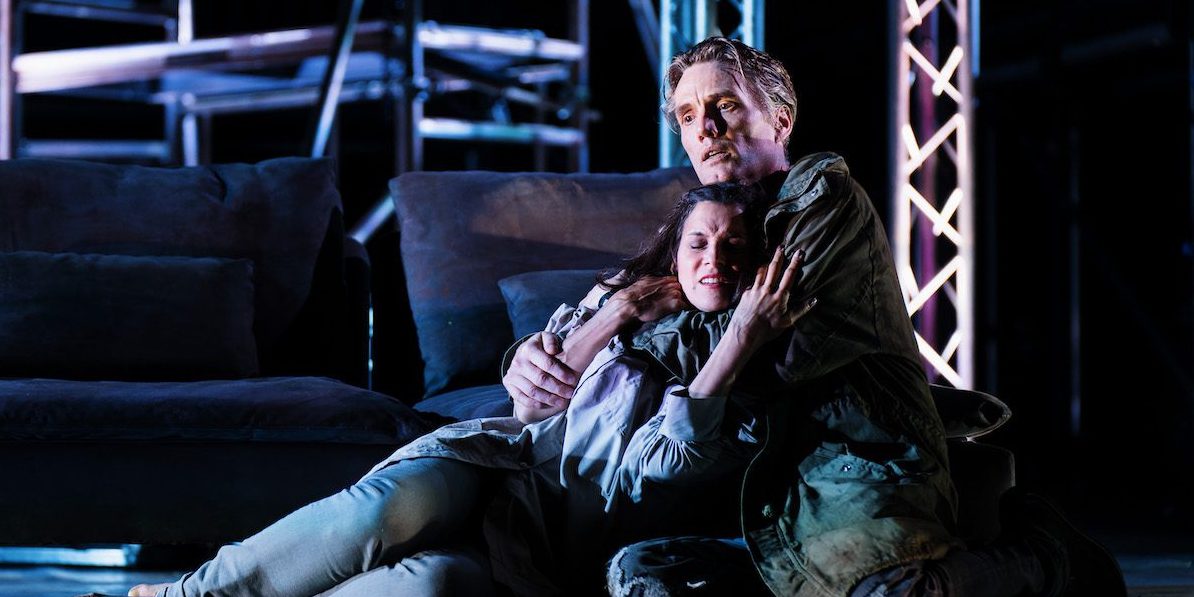Back in 2019 Grimeborn began its exploration of Wagner’s Ring cycle with the inspired idea of reviving the reduced-scale version devised by Jonathan Dove and Graham Vick twenty years before. In this adaptation, the operas are pruned of repetitions of the narrative, and the orchestral forces are reduced to around twenty. While this might seem like sacrilege to some, it is in fact a wonderful way of making Wagner more accessible to new audiences who might otherwise feel intimidated. Moreover, there are real advantages – there is a better balance between voices and orchestra so that the former no longer need to strain to be heard; and the dramatic lines and conflicts are more tightly drawn – less exposition and more action spread across three hours rather than five!
This year we are relocated for the second part of the cycle to the grandiose plush and bling of the Hackney Empire, a suitable venue as Valhalla, the home of the gods, begins to crumble under the weight of the self-deceptions Wotan has woven around himself. Siegmund and Sieglinde, intended agents of his liberation, can find each other but perish in the attempt. And Wotan’s favourite daughter, Brünnhilde, rebels against his authority. The end of pomp and circumstance is foreshadowed and a new age owing nothing to the corrupt politics of the gods is foretold.
This is a huge canvas and in musical terms, this production really delivers in both the set-pieces and the more intimate details. In the pit, Peter Selwyn conjures some lovely sounds out of the Orpheus Sinfonia. While we miss some of the internal shimmer and romantic swoop of a full orchestral string section, the clarity of individual lines appears more brightly, and there is no loss of power and impact in famous episodes, such as the Ride of the Valkyries. Likewise, the singing is uniformly good, with little sense of forcing of tone now the singers can ride the smaller orchestra rather than fight it.
The cast is entirely refreshed from ‘Rheingold’. In the title role, Laure Meloy sings with assurance and without fear. She also captures her character’s psychological journey from a naïve handmaid through to an independent thinker prepared to abandon the comforts of Valhalla and take a chance on human love and relationships. Natasha Jouhl and Finnur Bjarnason make a sweet-toned and plausible pair of lovers in the first act, and Jouhl is more forceful in her acting when she returns to hail the wonder of the future bound up in her pregnancy with Siegfried. In the smaller roles, Simon Wilding makes the most of the often-two-dimensional villain’s role of Hunding, and Harriet Williams make a much more sympathetic Fricka than usual, full of righteous indignation rather than shrewish vitriol. We also have a fine set of Valkyries, here only three rather than eight in number, but fully up to the vocal and dramatic challenge of protecting their sister against Wotan’s wrath.
Above all this is Wotan’s opera – a production stands or falls on the power and stamina of this performer. Here Mark Stone is outstanding. In a twenty-minute monologue that is the most remarkable piece of composition in the opera, he describes an arc between boastful swagger and complete despair and collapses into self-loathing that is completely compelling. He also has enough left in the tank at the end to pour out fatherly love to his daughter and reassert his authority in summoning the magic fire. It is rare to find such a complete account of the role from a singer fresh to the role.
The same creative team heads up this production as before, but this time their choices are less convincing. The opera is set in what appears to be an abandoned warehouse, so as to symbolise the isolation and insecurity of all the characters. But the confusion of gantries and walkways within the huge depth of this Victorian stage is often poorly lit and underexplored by the characters. There is also a wholly redundant sofa in the first scene which – bizarrely – Sieglinde and Siegmund have to clear away just when they should be consummating their love! Things improve in the second half, especially as the lighting design picks up, but in general, the acting remains basic and stilted, suggesting a lack of rehearsal time on stage thanks to pandemic constraints.

